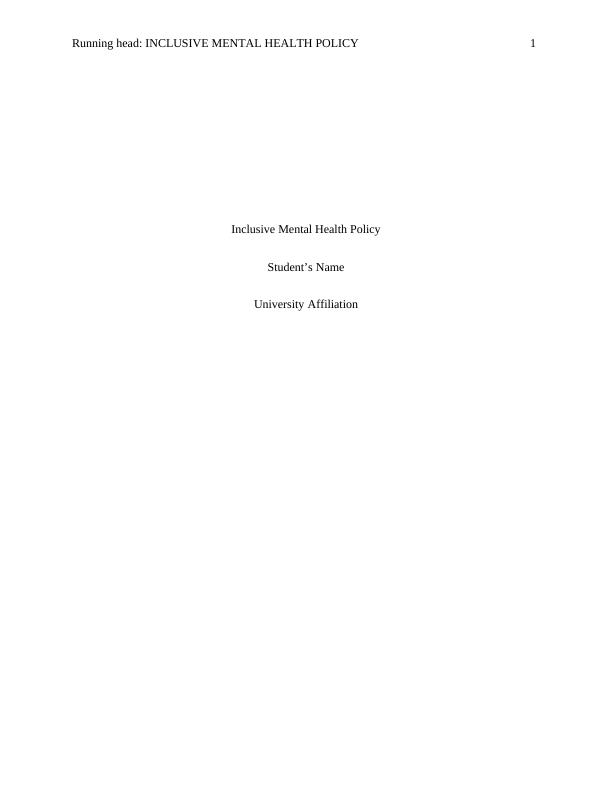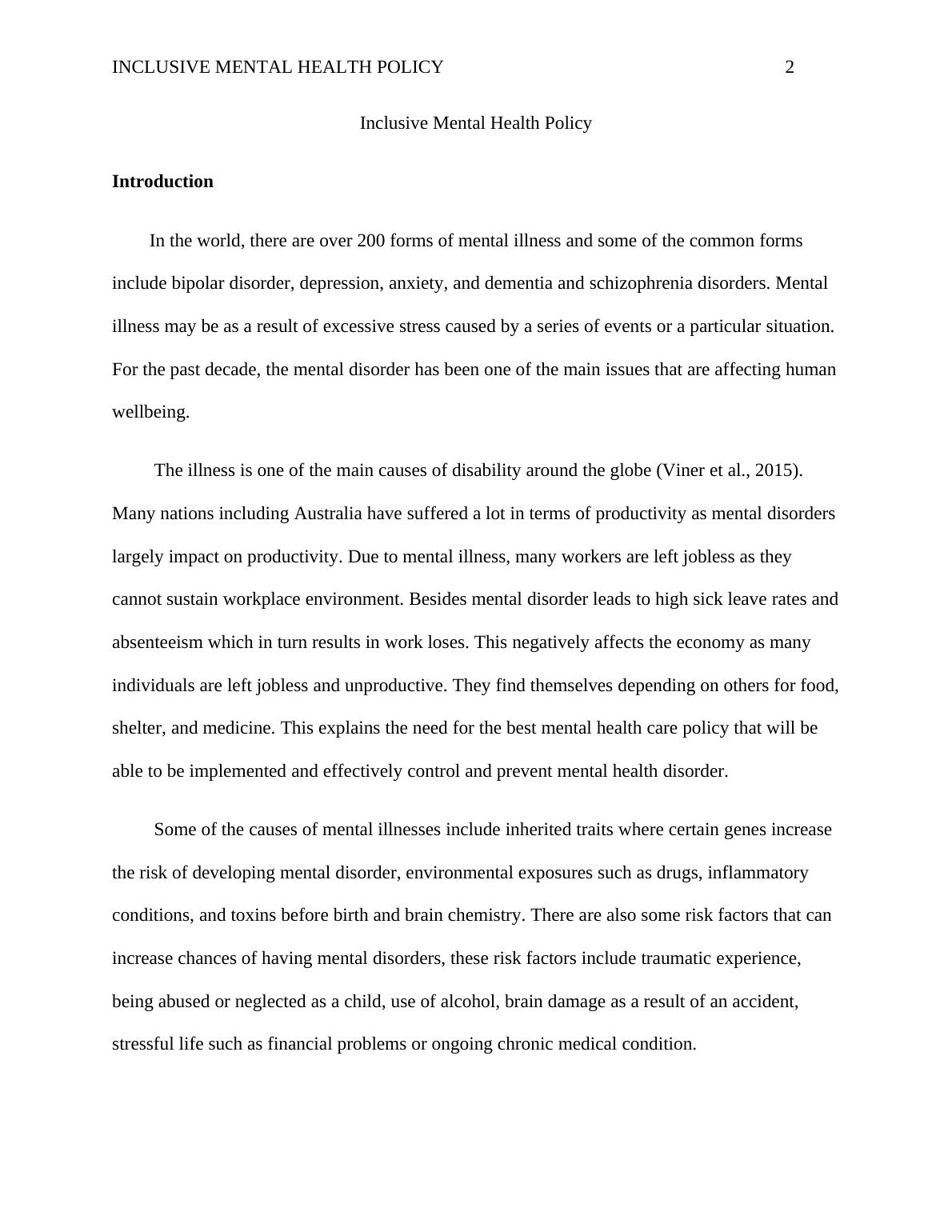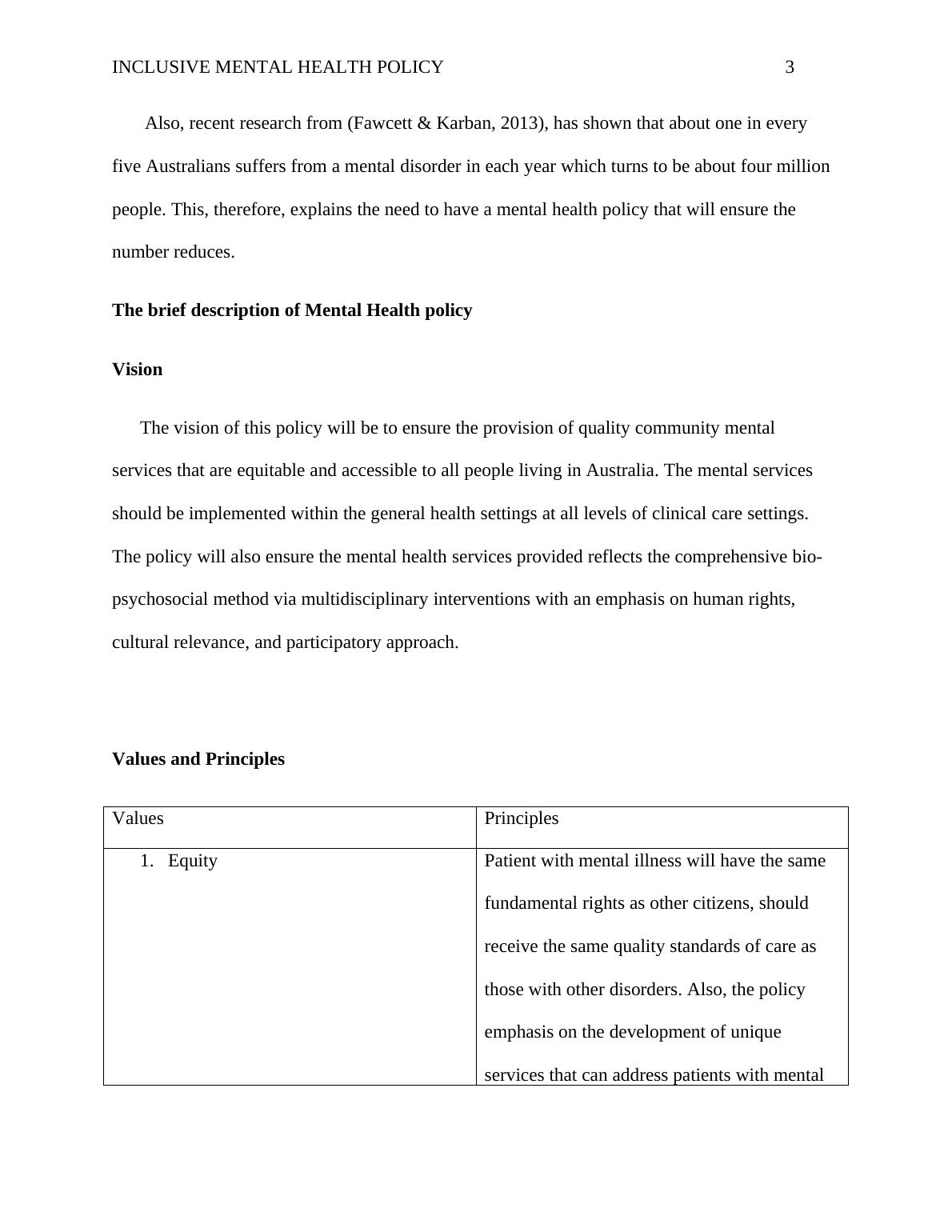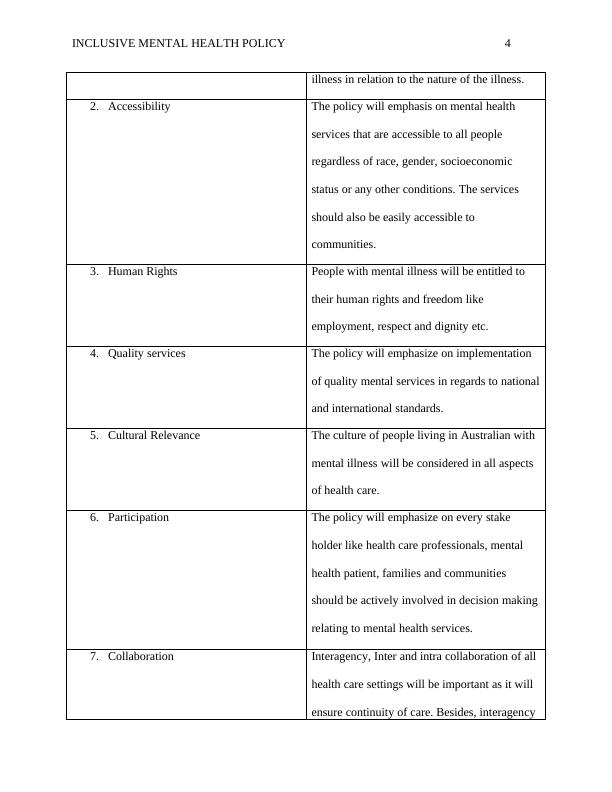Inclusive Mental Health Policy
Added on 2023-04-17
15 Pages3105 Words126 Views
Running head: INCLUSIVE MENTAL HEALTH POLICY 1
Inclusive Mental Health Policy
Student’s Name
University Affiliation
Inclusive Mental Health Policy
Student’s Name
University Affiliation

INCLUSIVE MENTAL HEALTH POLICY 2
Inclusive Mental Health Policy
Introduction
In the world, there are over 200 forms of mental illness and some of the common forms
include bipolar disorder, depression, anxiety, and dementia and schizophrenia disorders. Mental
illness may be as a result of excessive stress caused by a series of events or a particular situation.
For the past decade, the mental disorder has been one of the main issues that are affecting human
wellbeing.
The illness is one of the main causes of disability around the globe (Viner et al., 2015).
Many nations including Australia have suffered a lot in terms of productivity as mental disorders
largely impact on productivity. Due to mental illness, many workers are left jobless as they
cannot sustain workplace environment. Besides mental disorder leads to high sick leave rates and
absenteeism which in turn results in work loses. This negatively affects the economy as many
individuals are left jobless and unproductive. They find themselves depending on others for food,
shelter, and medicine. This explains the need for the best mental health care policy that will be
able to be implemented and effectively control and prevent mental health disorder.
Some of the causes of mental illnesses include inherited traits where certain genes increase
the risk of developing mental disorder, environmental exposures such as drugs, inflammatory
conditions, and toxins before birth and brain chemistry. There are also some risk factors that can
increase chances of having mental disorders, these risk factors include traumatic experience,
being abused or neglected as a child, use of alcohol, brain damage as a result of an accident,
stressful life such as financial problems or ongoing chronic medical condition.
Inclusive Mental Health Policy
Introduction
In the world, there are over 200 forms of mental illness and some of the common forms
include bipolar disorder, depression, anxiety, and dementia and schizophrenia disorders. Mental
illness may be as a result of excessive stress caused by a series of events or a particular situation.
For the past decade, the mental disorder has been one of the main issues that are affecting human
wellbeing.
The illness is one of the main causes of disability around the globe (Viner et al., 2015).
Many nations including Australia have suffered a lot in terms of productivity as mental disorders
largely impact on productivity. Due to mental illness, many workers are left jobless as they
cannot sustain workplace environment. Besides mental disorder leads to high sick leave rates and
absenteeism which in turn results in work loses. This negatively affects the economy as many
individuals are left jobless and unproductive. They find themselves depending on others for food,
shelter, and medicine. This explains the need for the best mental health care policy that will be
able to be implemented and effectively control and prevent mental health disorder.
Some of the causes of mental illnesses include inherited traits where certain genes increase
the risk of developing mental disorder, environmental exposures such as drugs, inflammatory
conditions, and toxins before birth and brain chemistry. There are also some risk factors that can
increase chances of having mental disorders, these risk factors include traumatic experience,
being abused or neglected as a child, use of alcohol, brain damage as a result of an accident,
stressful life such as financial problems or ongoing chronic medical condition.

INCLUSIVE MENTAL HEALTH POLICY 3
Also, recent research from (Fawcett & Karban, 2013), has shown that about one in every
five Australians suffers from a mental disorder in each year which turns to be about four million
people. This, therefore, explains the need to have a mental health policy that will ensure the
number reduces.
The brief description of Mental Health policy
Vision
The vision of this policy will be to ensure the provision of quality community mental
services that are equitable and accessible to all people living in Australia. The mental services
should be implemented within the general health settings at all levels of clinical care settings.
The policy will also ensure the mental health services provided reflects the comprehensive bio-
psychosocial method via multidisciplinary interventions with an emphasis on human rights,
cultural relevance, and participatory approach.
Values and Principles
Values Principles
1. Equity Patient with mental illness will have the same
fundamental rights as other citizens, should
receive the same quality standards of care as
those with other disorders. Also, the policy
emphasis on the development of unique
services that can address patients with mental
Also, recent research from (Fawcett & Karban, 2013), has shown that about one in every
five Australians suffers from a mental disorder in each year which turns to be about four million
people. This, therefore, explains the need to have a mental health policy that will ensure the
number reduces.
The brief description of Mental Health policy
Vision
The vision of this policy will be to ensure the provision of quality community mental
services that are equitable and accessible to all people living in Australia. The mental services
should be implemented within the general health settings at all levels of clinical care settings.
The policy will also ensure the mental health services provided reflects the comprehensive bio-
psychosocial method via multidisciplinary interventions with an emphasis on human rights,
cultural relevance, and participatory approach.
Values and Principles
Values Principles
1. Equity Patient with mental illness will have the same
fundamental rights as other citizens, should
receive the same quality standards of care as
those with other disorders. Also, the policy
emphasis on the development of unique
services that can address patients with mental

INCLUSIVE MENTAL HEALTH POLICY 4
illness in relation to the nature of the illness.
2. Accessibility The policy will emphasis on mental health
services that are accessible to all people
regardless of race, gender, socioeconomic
status or any other conditions. The services
should also be easily accessible to
communities.
3. Human Rights People with mental illness will be entitled to
their human rights and freedom like
employment, respect and dignity etc.
4. Quality services The policy will emphasize on implementation
of quality mental services in regards to national
and international standards.
5. Cultural Relevance The culture of people living in Australian with
mental illness will be considered in all aspects
of health care.
6. Participation The policy will emphasize on every stake
holder like health care professionals, mental
health patient, families and communities
should be actively involved in decision making
relating to mental health services.
7. Collaboration Interagency, Inter and intra collaboration of all
health care settings will be important as it will
ensure continuity of care. Besides, interagency
illness in relation to the nature of the illness.
2. Accessibility The policy will emphasis on mental health
services that are accessible to all people
regardless of race, gender, socioeconomic
status or any other conditions. The services
should also be easily accessible to
communities.
3. Human Rights People with mental illness will be entitled to
their human rights and freedom like
employment, respect and dignity etc.
4. Quality services The policy will emphasize on implementation
of quality mental services in regards to national
and international standards.
5. Cultural Relevance The culture of people living in Australian with
mental illness will be considered in all aspects
of health care.
6. Participation The policy will emphasize on every stake
holder like health care professionals, mental
health patient, families and communities
should be actively involved in decision making
relating to mental health services.
7. Collaboration Interagency, Inter and intra collaboration of all
health care settings will be important as it will
ensure continuity of care. Besides, interagency

End of preview
Want to access all the pages? Upload your documents or become a member.
Related Documents
Understanding Mental Health Issues: Symptoms, Causes and Treatmentlg...
|20
|6206
|85
Therapeutic Approaches for Managing Mental Illnesses: A Literature Reviewlg...
|19
|4578
|457
An Analytical Understanding of Mental Health and Pathophysiologylg...
|8
|2750
|390
MENTAL HEALTH CONSUMER POICElg...
|6
|1481
|100
Learning Mental Health and Various Outcomeslg...
|6
|987
|65
Impact of Welfare Provision Upon Social Groups Case Studylg...
|9
|2410
|169
